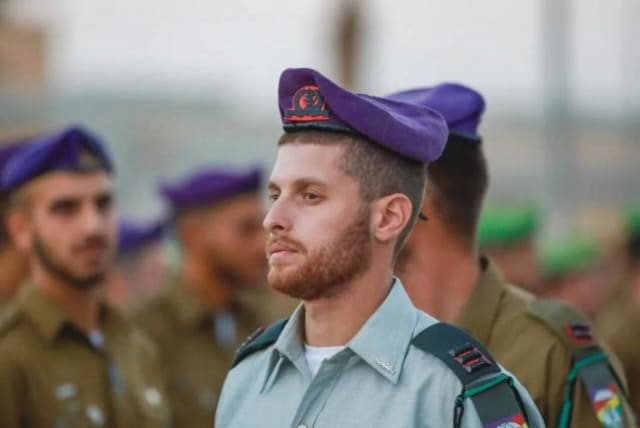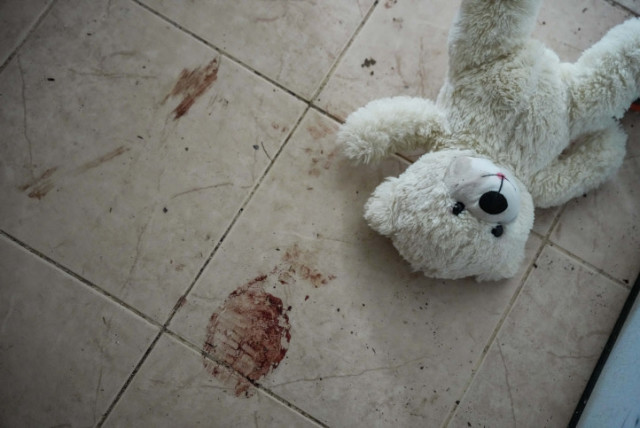IDF Givati commander recalls October 7 massacre, preparing for Gaza op.

Givati Capt. Dan Katzir responded to the Hamas October 7 massacre. Weeks later, he prepared with his soldiers for ground operations in Gaza.
On October 7, Capt. Dan Katzir was at home in Lehavim, a small community near Beersheba, about 35 km. from Gaza. Like many Israelis that day, he was woken up by the sound of explosions, the result of rocket launches from Gaza and Iron Dome interceptions.
I spoke to him several weeks after the horrors of October 7 as he was preparing with his Givati Brigade for operations in Gaza.
He discussed how he responded on October 7. Like many people across Israel who are combat trained and ready, he was keen to participate. He saw in a WhatsApp group for Lehavim that they were asking for all those who had firearms to come to the center of the community.
“There were police in the square, and I heard from what the police were talking about on the radio that there are terrorists in Ofakim,” he recalled.
Ofakim is a city that can be seen from the border with Gaza. It is about a 20-minute drive from Lehavim. Terrorists had targeted Ofakim and Sderot, two cities close to Gaza. They got to Sderot and slaughtered people in the streets before heading for the police station, where they killed police officers and then barricaded themselves inside.
Katzir drove to Ofakim. “I went home and got my uniform and car and went there. When I got there, I went to the police station and asked what had happened. There was a mess, with some wounded in the police station. I went with a cop to drive into the city to search for the terrorists.”
He now understood how serious the situation was. Katzir drove back home to get more military gear and then head toward the Gaza Strip.
He drove first to Sderot, through the rolling fields of the nearby communities. Many border communities were under assault or overrun by terrorists.
“I was alone. I joined some other [Israelis] I found with weapons and entered Kfar Az, and we did two days of fighting. Then I went to my unit,” he recalled.
Kfar Aza is a kibbutz on the border of Gaza. It was one of the hardest hit during the Hamas attack. People were massacred and/or kidnapped, and it took days to track down the terrorists and secure the area. This was a serious battle. Many of the units that responded that day ended up in Kfar Aza and helped liberate it from terrorists.
Israelis like Katzir didn’t hesitate to go toward the sound of the battle. They knew they had to protect their country. They were trained, but many did not know how bad October 7 would turn out to be.
“We didn’t think whether it was surprising or not, we knew what they can do. We see what they do. We were focused on fighting back and taking the territory back. We were not thinking about what happened or if it was a surprise,” he said.
ISRAELIS WITH combat experience, medics, and the whole country reacted with this automatic response. The questions about what happened on that day and whether Israel was unprepared will be answered after the war, said Katzir. Indeed, the message now is that this is a war for the homeland, it’s “them or us” as the Defense Ministry said.
“Now we are training to be ready to enter and to win. To destroy the organization we call Hamas,” stated Katzir. His unit is usually based in the North, but now his Givati Tzabar Battalion had been training for the next stage of war in Gaza.
“Now all the units are in the South ready to start [ground] operations in Gaza,” he said on the eve of the operation that began on October 27. He belongs to one of three Givati battalions, one of Israel’s major infantry brigades (along with Nahal, Golani, Kfir, Alexandroni, and others).
The unit trained for the two weeks after October 7. They prepared for the operation in Gaza, refreshing their knowledge of urban fighting.
“We try to learn the most we can about what happened and just be ready to go in, whether for a short or long time. We are trying to be ready for everything. We know we are going out after we finish the job,” said Katzir. He said his men were ready on the eve of the battle “when I spoke to them.”
“We are trying to train for all scenarios: open field, tunnel, high buildings, and urban. We all want to start; but every hour we get, we use it to get better and get ready,” he said.
Katzir, a platoon commander in the past, has served in the IDF for seven years. He has been on the Gaza border, in Judea and Samaria, and on the Lebanese border.
He affirmed: “I want to say we are ready and we know what we need to do – and we are not going to stop until we win.” ■
Shabbat protection
A video telling a miraculous survival story on October 7, the day of the Shabbat/Simchat Torah massacre in the South, is making the social media rounds.
Taken from a Hebrew-language program called Sparks of the Nation, according to the logo on the screen, it was forwarded to me by WhatApp from two separate channels within a couple of days. For the most part, the film is a close-up of a woman (sitting next to a girl, presumably her daughter) telling her story to two other women, seated at a table.
“I took knives,” the first woman begins, with the camera focused on her.
“I went into the bomb shelter, gave each child a knife, and said to them, ‘Guys, listen up, this is not a normal situation, this is something that has never happened before.’
“And suddenly,” she continues, “I see, exactly beyond my fence, six terrorists with drawn rifles, all chanting in Arabic. And I am standing there with two knives, looking through the peephole, just unable to believe it!
“And at that moment, I looked up to God and said, Borei Olam (Creator of the Universe), I promise you one thing; I promise you that I will keep Shabbat until the day I die. Borei Olam, God, I will keep every Shabbat.
“Protect me and my children because I am in danger now! It can’t be, this isn’t my end, I haven’t finished my tikkun [mission], I am begging you, Borei Olam,” she says, breaking into tears. “I really saw the end – it’s taking me back.”
She immediately recovers and continues: “And at the instant when I took it upon myself to keep Shabbat, they skipped over my house; they simply vanished.”
The Jerusalem Post and OneFamily are working together to help support the victims of the Hamas massacre and the soldiers of Israel who have been drafted to ensure that it never happens again.
Jerusalem Post Store
`; document.getElementById("linkPremium").innerHTML = cont; var divWithLink = document.getElementById("premium-link"); if (divWithLink !== null && divWithLink !== 'undefined') { divWithLink.style.border = "solid 1px #cb0f3e"; divWithLink.style.textAlign = "center"; divWithLink.style.marginBottom = "15px"; divWithLink.style.marginTop = "15px"; divWithLink.style.width = "100%"; divWithLink.style.backgroundColor = "#122952"; divWithLink.style.color = "#ffffff"; divWithLink.style.lineHeight = "1.5"; } } (function (v, i) { });

